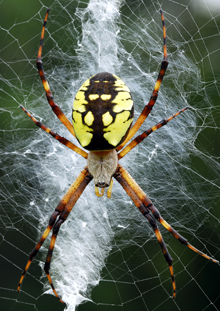Spiders: What's the fear factor?
Each Halloween, huge “spider webs” with hairy spider figures appear on houses, fences and trees. In the popular imagination, spiders are partners in evil with the vampires and zombies that come alive on All Hallow's Eve. “I remember spider movies from the '50s. In film, being attacked by a giant spider with dripping jaws is not a good thing!” says Terry Christenson, a Tulane expert on evolution of behavior in spiders.

Do humans have an inborn fear of spiders? Terry Christenson, an expert on evolution of behavior in spiders, believes it's a culturally acquired phobia. (Photo from iStockphoto)
Christenson, an associate professor of psychology, says, “I think some people are afraid of spiders, and some aren't.” Recently Christenson has been teaching a course on evolution as it applies to humans. “Fear that's very deep, very old in us,” he says. “At a basic level, fear is an adaptive mechanism that's probably very important for survival.” But do humans have an inborn fear of spiders?
“I don't think so,” says Christenson. “The frequency with which people run into trouble with spiders is not as great as with some other animals and situations. Fear of spiders is probably acquired as individuals develop, and is mostly cultural. Most people really don't have a fear of spiders. Spiders are not out cruising around looking for trouble. You have to go poking around to find them.” Christenson's own research on actual spider behavior focuses not on the adaptive force of fear, but on spiders' uniquely evolved strategies of sexual selection.
“Darwin first suggested the notion of sexual selection,” he says. “Usually it's males competing for females, and females being relatively choosier about males.” A female spider has multiple storage sacs for sperm, so while she may have multiple breeding partners, she can still make sexual choices after the act of mating.
“I've been taking sexual selection from the organism level, the male and female individual level, to the gamete level,” says Christenson.
